The latest wave of the coronavirus pandemic is once again wreaking havoc on our daily lives.
On Sunday, a record 30,000-plus cases of the Omicron strain were recorded, a number far beyond any registered since the onset of the pandemic.
Although the vast majority of those infected are experiencing mild symptoms, the number of serious cases has doubled over the last week.
There is hardly anyone who isn’t being affected by this crisis.
Whether it’s a day-care worker getting infected, forcing children to remain home or an office colleague testing positive requiring co-workers to get tested and work from home, the country is in the midst of turmoil that we haven’t seen since the lockdowns of 2020.

A big difference this time is the government’s resolve to keep the economy open and allow businesses to operate “as usual.”
Prime Minister Naftali Bennett, both in his role in the opposition at the beginning of the pandemic and as head of the coalition, has been adamant about keeping the country open.
According to Bank of Israel statistics, the previous lockdowns in March-April 2020, that September and December-January 2020-21 cost the economy NIS 200 billion.
“We got through the Delta variant without a single day of lockdown. We didn’t close businesses and we didn’t close the education system,” Bennett said last month at a Globes conference. “I can’t yet say exactly how this [Omicron] wave will affect us; I can say that we shall make every effort possible to maintain continuity in the economy.”
However, as anyone who goes out can see, businesses are suffering greatly. Restaurants, cafes, nightspots, malls and retail establishments are all seeing a sharp drop in clientele and revenue.
To say nothing of the tourism industry, which remains in dire straits entering the third year running.
In addition, even though the economy isn’t shut, it’s still hemorrhaging due to the rising number of infected people, whether it’s the cost of workers being in quarantine, the Green Pass restrictions on businesses or the limits on foreign travel.
In essence, although it’s not official, we are in a de facto lockdown of sorts. People are reluctant to go out, more and more of the country is getting infected, and the economy is suffering.
Finance Minister Avigdor Liberman has not been one to show sensitivity to the micro difficulties that individuals are facing in light of the pandemic. He famously upset tourism professionals late last year when he urged them to start retraining in other vocations.
On Sunday, he announced that businesses harmed by COVID restrictions would receive some form of compensation, as was done during the previous lockdowns, but he expressed the opinion that most of the economy was weathering the storm just fine.
“We must help every business that gets hit… but at the end of the day, most businesses are in excellent shape, and I’m happy about that,” he said. “There will be aid to businesses hurt by COVID, but there won’t be any handouts. There won’t be any electoral bribery.”
It’s unlikely that small businesses in danger of going under, or self-employed people who are in quarantine, would consider financial aid to be “electoral bribery” in any sense of the words. It would be a lifeline to help them survive until the Omicron surge subsides and some semblance of normalcy that we witnessed in the fall returns.
By not officially declaring a lockdown, the government cannot escape its responsibility to help those who are financially suffering the most due to the current situation. Just like with the previous lockdowns during the pandemic, it’s up to the Finance Ministry to step up and provide compensation and financial aid.
Liberman’s suspicions that there are some people out there who would exploit the system to line their pockets might have some merit, but that argument is outweighed by the vast majority of citizens who don’t know where their next paycheck is going to come from or how they’re going to afford to buy food or pay for heat.
We may not be in an official lockdown, but the debilitating effects are nearly the same. We urge the government to devise and implement a compensation package immediately – before it’s too late.
